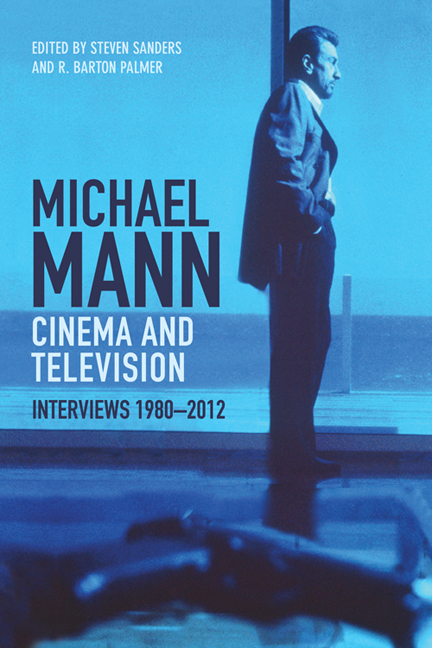Book contents
- Frontmatter
- Contents
- List of Illustrations
- Acknowledgements
- Introduction: Michael Mann in His Interviews
- 1 Four Minute Mile
- 2 Castle Keep
- 3 Of Vice and Mann
- 4 Manhunter: An Interview with Michael Mann
- 5 Michael Mann: Hollywood Writer–Director–Producer
- 6 Mann and His Movies
- 7 All the Corporations’ Men
- 8 Smoking Gun
- 9 “Ali Likes the Film a Lot. He's Seen it Six Times”
- 10 Paint it Black
- 11 Mann Among Men
- 12 L.A. Belongs to the Coyotes
- 13 Michael Mann Interview
- 14 A Mann's Man's World
- 15 Number One with a Bullet
- 16 The Study of Mann
- Chronology
- Filmography
- Publisher's Acknowledgments
- Index
2 - Castle Keep
Published online by Cambridge University Press: 05 September 2016
- Frontmatter
- Contents
- List of Illustrations
- Acknowledgements
- Introduction: Michael Mann in His Interviews
- 1 Four Minute Mile
- 2 Castle Keep
- 3 Of Vice and Mann
- 4 Manhunter: An Interview with Michael Mann
- 5 Michael Mann: Hollywood Writer–Director–Producer
- 6 Mann and His Movies
- 7 All the Corporations’ Men
- 8 Smoking Gun
- 9 “Ali Likes the Film a Lot. He's Seen it Six Times”
- 10 Paint it Black
- 11 Mann Among Men
- 12 L.A. Belongs to the Coyotes
- 13 Michael Mann Interview
- 14 A Mann's Man's World
- 15 Number One with a Bullet
- 16 The Study of Mann
- Chronology
- Filmography
- Publisher's Acknowledgments
- Index
Summary
Has Michael Mann gone Gothic?
Deep in the granite depths of a Transylvanian castle, something terrifying stirs. It is none other than the transmogrifying remains of F. Paul Wilson's best-selling shock-horror novel The Keep, now coming to life as a $6-million grand guignol fantasy. Mann, the writer–director of Thief and (for TV) The Jericho Mile, has set out to transform Wilson's potboiler about vampires versus the Third Reich into a multi-layer allegory. And now, after a six-month delay due to the death of special effects wizard Wally Veevers, The Keep is ready to go as one of Paramount's big releases this Christmas.
I met Mann amid the towering sets of the castle's interior at Shepperton Studios, London. Black stone walls beetle ceilingward; shafts of eerie blue light rake the sound stage; and charred human remains, victims of the omnivorous monster at the movie's centre, are uggily [sic] discernible in nooks and crannies.
This is the Keep – or at least its studio-built interior. For location shooting, a giant slate quarry in Wales has been used, where a specially built Rumanian village nestles inside the striated cliff-walls, one of which doubles as the majestic castle entrance.
Mann insists that the movie is not just your common-or-gargoyle horror pic but a fairy tale for our times. And he will forcefully wave a copy of Bruno Bettelheim's The Uses of Enchantment at you if you look quizzical. (It's best to wave back.) Bettelheim explained how fairy tales were complex moral fables salutary for adults and children alike. He insisted (and so does Mann) that unlike myths, which are built around clearly identified heroes and usually given a tragic ending, fairy tales are universal, generalized, and energetically moralistic. They also favor the happy ending. Says Bettelheim: “The myth is pessimistic while the fairy tale is optimistic, no matter how terrifyingly serious some of the story may be.”
And terror, claims Mann, crowds The Keep. Its most notable nasty is a metamorphosing monster called Molasar with a need for consuming human essence by destroying human life. Into this creature's domain stumble such tasty quarries as Jürgen Prochnow (Nazi officer), Dr. Ian McKellen (Jewish historian sprung from Dachau to investigate the ogre), Alberta Watson (McKellen's daughter), and Scott Glenn as Glaeken Trismegistus, destiny's chosen antagonist to Molasar. –H.K.
- Type
- Chapter
- Information
- Michael Mann - Cinema and TelevisionInterviews, 1980-2012, pp. 32 - 38Publisher: Edinburgh University PressPrint publication year: 2014



